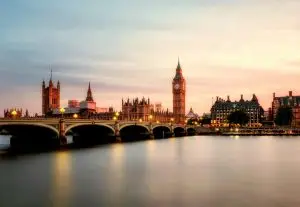Conservative Party politicians, delegates and activists headed to Manchester for the Party’s annual conference. Below Brevia has summarised the key takeaways and policy developments.
As the dust settles on the aftermath of the Conservative conference, it reveals the lingering aftermath of strained relationships and challenging polling figures, hinting at a difficult journey ahead as the general election looms ever closer. The most recent polling data shows the Conservatives at 24% of the vote compared to Labour’s commanding 45%.[1] In response, Rishi Sunak has embarked on a mission to redefine both himself and his party, aiming to showcase a distinct departure from the strategies of previous Tory administrations.
However, one of the central topics that captured both attention and controversy was the uncertain fate of the HS2 project. Despite attempts to shift the focus, the ambiguity over the future of the project and ultimately the decision to cancel later phases of the project overshadowed much of the conference.
Amidst this, the relationship between the Government and business communities faced notable strains, partly due to the repercussions of the HS2 decision and the altered timeline for the petrol and diesel ban announced weeks before.[2] These sudden shifts engendered a sense of instability, leaving the business sector in search of long-term reassurance and stability.
While numerous ministers delivered speeches that many view as lacking detail, Rishi Sunak’s keynote address stood out as an attempt to rebrand the party, positioning himself as the ‘change candidate’ despite the Conservative Party’s long tenure in government. His proposals included a new post-16 qualification, a gradual ban on smoking and a £36 billion plan to improve transport in the North. Nonetheless, the murmurs of a potential post-Sunak era permeated various fringe events, hinting at underlying leadership struggles within the party. Particularly from supporters of prominent frontbenchers such as Suella Braverman and her potential rival Kemi Badenoch. Their perceived anti-immigration, ‘anti-woke’, and anti-net-zero stance also drew criticism from those advocating for diversity and sustainability.
The Government’s commitment to levelling up appeared relatively neglected during the conference, with minimal updates on the progress of the 12 missions. Michael Gove’s focus was predominately on housing, but one announcement of a £1 billion allocation to 55 towns over a decade did align with the levelling up narrative.[3] Notably, the debate around the sanctity of the green belt gained prominence, with calls for potential reform to address the ongoing housing crisis, alluding to the need for a balance between conservation and urban development. Former housing minister Brandon Lewis, said while he thought the green belt was “hugely important”, it needed reforming.[4]
Senior Tory MPs emphasised the need for lower taxes, advocating for tax cuts to stimulate economic growth. Former Prime Minister Liz Truss championed this cause, at a packed fringe event, emphasising the reduction of corporate tax and the removal of bureaucratic barriers to reinforce the party’s pro-business stance.[5]
Immigration policies remained a persistent issue, against the backdrop of a longstanding debate surrounding the need to curtail immigration into the UK. Suella Braverman’s impassioned address called for stringent measures to restrict a ‘hurricane’ of migration.[6]
Discussions surrounding gender and transgender issues dominated the discourse, with six cabinet members mentioning this in their speeches. [7] Health Secretary Steve Barclay announced a ban on trans women from female NHS wards and Home Secretary Suella Braverman said she would forbid sex offenders from changing gender. The Prime Minister used his speech to assert that ‘a man is a man and a women is a women’, sparking some unease within the party.[8]
On the technological front, discussions on AI regulations took centre stage, reflecting the party’s efforts to grapple with the complexities and opportunities presented by emerging technologies.
In essence, with lacklustre polling in the background and the forthcoming general election on the horizon, the Conservative conference wrestled with defining the party’s future narrative, striving to portray a resilient and competitive profile. The conference served as a platform for unveiling internal discord, yet also provided valuable insights into the focal points that are set to steer the party’s course in the build-up to the upcoming general election.
[1] YouGov, ‘Voting Intention’, October 2023, Link
[2] Institute for Government, ‘Key Takeaways Conservative Party Conference’, October 2023, Link
[3] Institute for Government, ‘Key Takeaways Conservative Party Conference’, October 2023, Link
[4] BBC News, ‘Five policy ideas being pushed at Conservative Party conference’, October 2023, Link
[5] BBC News, ‘Five policy ideas being pushed at Conservative Party conference’, October 2023, Link
[6] The Week, ‘Five Key Takeaways from the Conservative Party Conference’, October 2023, Link
[7] The Week, ‘Five Key Takeaways from the Conservative Party Conference’, October 2023, Link
[8] The Independent, ‘Rishi Sunak tacks to right with comments on sex education and transgender rights’, October 2023, Link




